Crazy. That’s what we sometimes call our busy schedule, schlepping books here and there, serving others with a few boxes selected for a small event, or a truck load for a larger gig, often two or more events at the same time, and, all the while, keeping the shop open, six days a week. Of course Beth and I enjoy this “on the road” aspect of our work (and we couldn’t do it without our dedicated staff who work hard each and every day in Dallastown.) Sometimes, though, we grow weary. I’ve heard people say that they get tired just listening to our wacky schedules. We sometimes wonder if it is healthy, being stretched and stressed, juggling a too few many balls in the air some months, so often in a hurry.
We loved our time at Montreat College this week, and respect the remarkably good work they
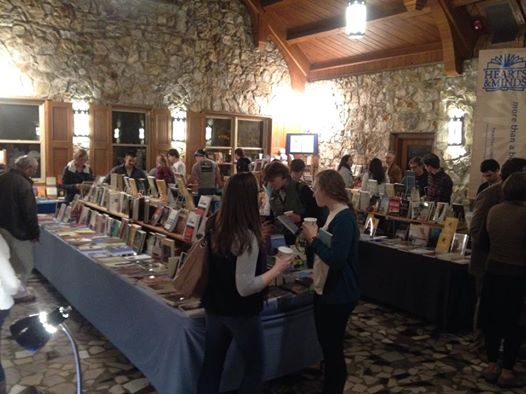
are doing there at that small, liberal arts college tucked into a mountainous cove in the Black Mountains of North Carolina. Doing workshops and selling books and speaking there, serving their “Faith and Vocation Symposium,” was surely one of the most memorable and rewarding things we’ve done this year. Thanks to folks there for hospitality and receptivity (and for help with the book packing!) It was a whirlwind event, but very meaningful for us.
But we’re reminded again of our crazy schedule — we had to hurry back, not lingering there, or on the beautiful Route 81 drive north because Friday night (tonight, November 7th) we are hosting C. Christopher Smith, co-author of the very provocative, thoughtful, and important book,
Slow Church: Cultivating Community in the Patient Way of Jesus. (You can read
my earlier, longer review, here.)
Yes, we are having an author appearance, book reading, and slow church conversation with
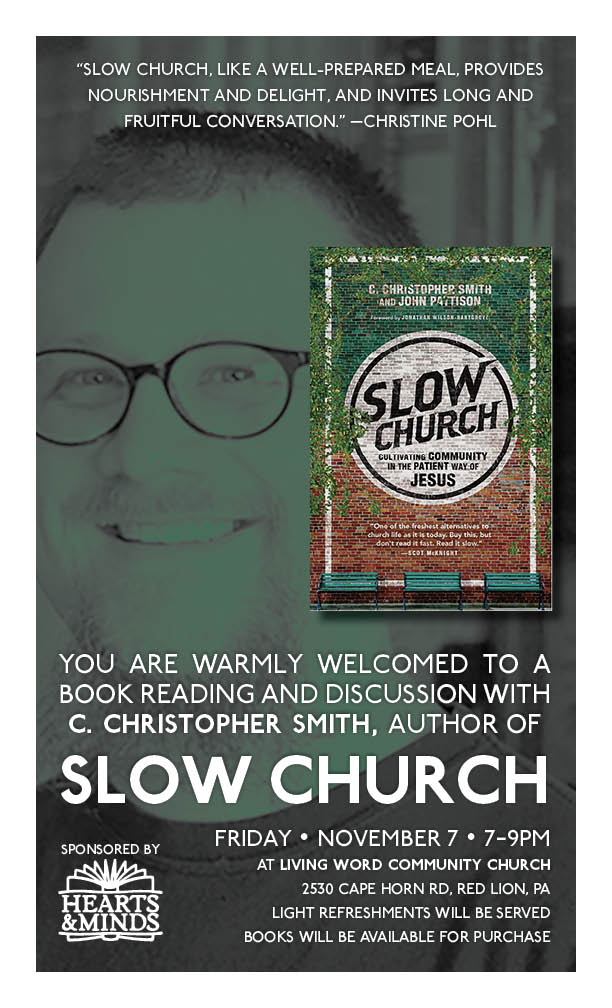
Chris, starting at 7:00 pm over at the nearby Living Word Community Church, 2530 Cape Horn Road, Red Lion, PA. (We’re very grateful for their support of our occasional projects, and their great coffee bar, free parking and warm space to host a book signing like this.)
Ironic, eh? We are nearly burned out from a bunch of events, a lot of hustle, and too much speed, only to hurry back to this slow, patient conversation about, uh, yeah: slowing down, learning patience, resisting the tendencies of our culture that suggest We Can Have It All and We Can Do It All.
In what Christopher Smith and his co-author call the “McDonaldization” of the church, modern congregations sometimes seem to adopt strategies out of the fast food industry — ending up with seemingly tasty offerings efficiently delivered with speed and uniformity, maybe even with zippy ad campaigns to complete the consumerist brand — and have thereby unknowingly subverted or compromised what should be at the heart of any church: relationships, community, authenticate care for people and places and the quality of our life together.
Faith, of course, is not a product to be marketed or consumed, and church is not a business.
Large or small church, evangelical or mainline, most of us know that. But sometimes, we need to step back and ponder the pressures, to wonder a bit about it all.
Slow Church takes a cue from the “slow food” movement, and invites us to think about church being informed by terroir (the foodie term explaining how the local ground seeps into the very taste of wine or food), stability (“fidelity to people and place”), and patience. They invite us to take up deliberate slowness which allows a greater attention to relationships and context; such relationships, not incidentally, allows us enter more deeply into the suffering of others.
The book begins with a little study of the industrialization of the church, which has paralleled the industrialization of agriculture — not to mention the near demise of the family farm. They quote Joel Salatin (who’s book about farming we stock here, and showed at the farming workshop at Montreat, btw), Michael Pollan’s The Omnivore’s Dilemma and the documentary Food, Inc. The profound social criticism of Salatin, Pollan, Wendell Berry, and the like is wise and important. Applying it to the church is a stroke of generative brilliance. In Slow Church Salatin is quoted noting that
conventional agriculture experts view the soil as merely a convenient way to hold up the plant while it is fed from the top in the form of ever-increasing doses of chemical fertilizers. He describes this process as superimposing a mechanistic mindset onto a biological world. Nature, in contrast, feeds the plants from the bottom up, through the soil. Thus, for the conscientious farmer, the health of the soil is a top priority.
Ahh, you can see the connection to church, can’t you? Caring for the foundational stuff, patiently bearing good fruit by attending to the soil.
Slow Church continues:
Western Christianity has similarly adopted shortcuts that are the church equivalent of imposing a mechanistic mindset onto a biological world. When evaluated in terms of efficiency — defined as the easiest way to get someone from here to there, from unsaved to saved, from unchurched to churched — these top-down inputs seem to yield impressive short-term results: they can sometimes pack the pews. So, on the upside, the church has been busy.
But then, this: “on the downside, it’s not clear at what long-term costs these methods have been employed or how helpful and sustainable they will be going forward.”
That is just the beginning of the remarkably interesting, well-written, and deeply considered rumination offered in Slow Church and we are thrilled to have Chris with us to continue the conversation over at Living Word Friday night.
As the authors put it, “Slow Food and other Slow movements hold important lessons for the American church. They compel us to ask ourselves tough questions about the ground our faith communities have ceded to the cult of speed.”
The cult of speed.
Ouch.
In a way, this is something I need to hear, now. My own workaholism, my own tendency to live as if God’s creation has no limits, my assumptions about scarcity (rather than the generous abundance of God’s economy in which we can rest) all need to be evaluated and refined. Of course, most churches — indeed most of us with super-hectic, busy lives, want “quality over quantity” and no church I know is only interested in metrics and numbers, growth for its own sake. Of course, I don’t know any bone fide mega-churches, but from what I gather, folks at places a lot like Willow Creek, for instance, resonant deeply with these very concerns. Willow Creek themselves have been very committed to nurturing a more contemplative spirituality and a radical social vision, including notable wor
k in peace and justice, charity and service. Chris has spoken about the book, and it is being used, in a number of fairly large churches who are eager to apply the books principles within their own fast-paced, very professional context.
It is clear that even those of us with very good intentions, who have read books about slowing
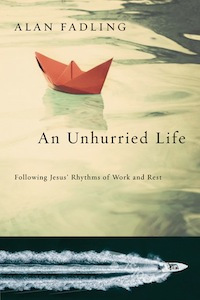
down, practicing spiritual disciplines, keeping Sabbath, focusing on quality, being deeply faithful rather then merely popular, we too often are undone by our own bad habits and co-opted imaginations. (Alan Fadling’s
An Unhurried Life: Following Jesus’ Rhythms of Work and Rest is just one recent book that I found very, very helpful and wise in this area.) As Jamie Smith has reminded us in his stunningly important
Desiring the Kingdom, our passions and desires and habits and practices are most often informed more by the secular liturgies of the world than the often thin formation generated within the local church.
So, ironic as it may be, Beth and I are zooming ahead, creating this program, and are fretting that we get enough turn-out. Our guest author, Mr. Smith, may care less about this than I do, but my eagerness for numbers — people showing up, books being sold — perhaps needs to be adjusted. Is repentance too demanding a word? This “slow church manifesto” does make me squirm a bit.
If you are in the region, come on by. It will be a good conversation, you’ll get to meet a low-key, down-home, small-church leader who will help us talk about our culture and our lives, our churches and our ministries.
If you want an edition autographed by Chris, let us know right away, and we’ll see if we can make that happen, too. It would make a nice gift for a church leader or pastor you know.
***
Thanks to those who have extended very warm words about my fast and furious closing
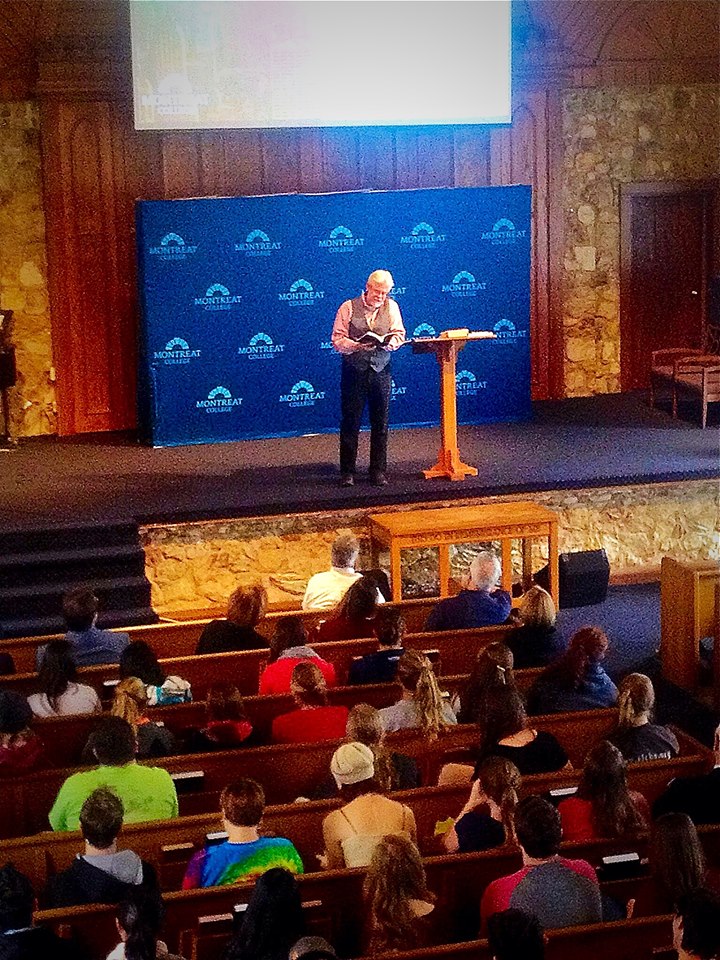
plenary talk at the Montreat Faith and Vocation Symposium. I hear they might post videos at the Montreat College website of all four talks, each which were quite good. The first was on creation/vocation, by Tom Nelson, author of
Work Matters; then the fall and sorrow was explore profoundly by Steve Garber, author of
Fabric of Faithfulness and
Visions of Vocation (starting with a Mumford & Sons song); next, a broad and decisive redemption was gloriously proclaimed, eloquently and powerfully spoken by Messiah College chaplain, Donald Opitz, co-author of
Learning for the Love of God: A Guide to Academic Faithfulness; lastly, there was yours truly, preaching about the adventure of living out this hope of a restored creation, the implications of this kind of big gospel, a closing with a meditation on “Standing in the Breech” from the new album by that name by Jackson Browne. This grand Biblical story that calls us to work in the world, for the life of the world, by realizing that God’s Kingdom is best known as the creation regained, is not only taught by the books I drew upon in my final talk —
When the Kings Come Marching In: Isaiah and the New Jerusalem by Richard J. Mouw and
Surprised by Hope: Rethinking Heaven, Resurrection, and the Mission of the Church — but, interestingly enough, also in this wonderful
Slow Church: Cultivating Community in the Patient Way of Jesus. The vision of a wholistic worldview, if you will, shaped and informed by the epic rescue plan portrayed in the flow of the drama of Scripture, is what we talked about with the students and faculty at Montreat (especially applying it to college life, majors, callings, and careers.) It is also what Smith and Patterson remind us of in the dynamic and evocative middle part of
Slow Church and apply it to the nature of the local church.
Just listen to the conversation topics in the “second course” of this meal (in keeping with their
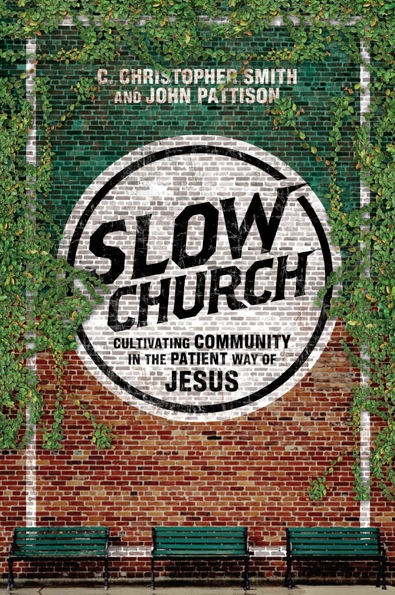
slow food theme, each unit of the book is envisioned as one of a three course meal.)
They call the second course “ecology” and they talk about wholeness (that is, the reconciliation of all things), work, by which they mean “cooperating with God’s reconciling mission, and, then, also, sabbath, which they invite us to consider as the “rhythm of reconciliation.” This gracious good news of God reconciling all things, restoring all things, bringing healing and wholeness and hope to the creation that is so loved, appears to us here in the midst of our broken history and dysfunctional culture and often less than faithful churches.
Can our churches learn to be crucibles of the Kingdom, to be places where, in deep and real relationships, we replace fast-food-like cookie-cutter, quick and easy techniques with more mature, sustainable, deeply spiritual ways of pursuing a missional lifestyle of wholistic discipleship? Can our formation in community allow us to become more missional, taking up vocations to care about the Story of God? Can we?
Well, yes we can. We saw glimpses at Montreat. We know of glimpses at our host church, Living Word Community Church in Red Lion. You have tasted deep spiritual quality in your own life and relationships, too, I’m sure. We just have to slow down enough to allow God’s abundance to take root.
If you can, please join us at 7 tonight for a casual evening with Chris Smith designed to ponder this slow process of spiritual formation in a local church that is radically Christian, maybe even considering how to be counter-cultural, willing to resist the pragmatic and glitzy, in search of a deeper, more communal expression of radical discipleship.
If you can’t join us, you can order the book from us. It’s tasty, almost gourmet. But be prepared to chew a bit. And be sure to read it with others. Slow food together is much more fun.
BookNotes

SPECIALDISCOUNTANY ITEM MENTIONED
20% off
order heretakes you to the secure Hearts & Minds order form pagejust tell us what you want
inquire he
re
if you have questions or need more information
just ask us what you want to know
Hearts & Minds 234 East Main Street Dallastown, PA 17313 717-246-3333
 are doing there at that small, liberal arts college tucked into a mountainous cove in the Black Mountains of North Carolina. Doing workshops and selling books and speaking there, serving their “Faith and Vocation Symposium,” was surely one of the most memorable and rewarding things we’ve done this year. Thanks to folks there for hospitality and receptivity (and for help with the book packing!) It was a whirlwind event, but very meaningful for us.
are doing there at that small, liberal arts college tucked into a mountainous cove in the Black Mountains of North Carolina. Doing workshops and selling books and speaking there, serving their “Faith and Vocation Symposium,” was surely one of the most memorable and rewarding things we’ve done this year. Thanks to folks there for hospitality and receptivity (and for help with the book packing!) It was a whirlwind event, but very meaningful for us. Chris, starting at 7:00 pm over at the nearby Living Word Community Church, 2530 Cape Horn Road, Red Lion, PA. (We’re very grateful for their support of our occasional projects, and their great coffee bar, free parking and warm space to host a book signing like this.)
Chris, starting at 7:00 pm over at the nearby Living Word Community Church, 2530 Cape Horn Road, Red Lion, PA. (We’re very grateful for their support of our occasional projects, and their great coffee bar, free parking and warm space to host a book signing like this.) down, practicing spiritual disciplines, keeping Sabbath, focusing on quality, being deeply faithful rather then merely popular, we too often are undone by our own bad habits and co-opted imaginations. (Alan Fadling’s An Unhurried Life: Following Jesus’ Rhythms of Work and Rest is just one recent book that I found very, very helpful and wise in this area.) As Jamie Smith has reminded us in his stunningly important Desiring the Kingdom, our passions and desires and habits and practices are most often informed more by the secular liturgies of the world than the often thin formation generated within the local church.
down, practicing spiritual disciplines, keeping Sabbath, focusing on quality, being deeply faithful rather then merely popular, we too often are undone by our own bad habits and co-opted imaginations. (Alan Fadling’s An Unhurried Life: Following Jesus’ Rhythms of Work and Rest is just one recent book that I found very, very helpful and wise in this area.) As Jamie Smith has reminded us in his stunningly important Desiring the Kingdom, our passions and desires and habits and practices are most often informed more by the secular liturgies of the world than the often thin formation generated within the local church. plenary talk at the Montreat Faith and Vocation Symposium. I hear they might post videos at the Montreat College website of all four talks, each which were quite good. The first was on creation/vocation, by Tom Nelson, author of Work Matters; then the fall and sorrow was explore profoundly by Steve Garber, author of Fabric of Faithfulness and Visions of Vocation (starting with a Mumford & Sons song); next, a broad and decisive redemption was gloriously proclaimed, eloquently and powerfully spoken by Messiah College chaplain, Donald Opitz, co-author of Learning for the Love of God: A Guide to Academic Faithfulness; lastly, there was yours truly, preaching about the adventure of living out this hope of a restored creation, the implications of this kind of big gospel, a closing with a meditation on “Standing in the Breech” from the new album by that name by Jackson Browne. This grand Biblical story that calls us to work in the world, for the life of the world, by realizing that God’s Kingdom is best known as the creation regained, is not only taught by the books I drew upon in my final talk — When the Kings Come Marching In: Isaiah and the New Jerusalem by Richard J. Mouw and Surprised by Hope: Rethinking Heaven, Resurrection, and the Mission of the Church — but, interestingly enough, also in this wonderful Slow Church: Cultivating Community in the Patient Way of Jesus. The vision of a wholistic worldview, if you will, shaped and informed by the epic rescue plan portrayed in the flow of the drama of Scripture, is what we talked about with the students and faculty at Montreat (especially applying it to college life, majors, callings, and careers.) It is also what Smith and Patterson remind us of in the dynamic and evocative middle part of Slow Church and apply it to the nature of the local church.
plenary talk at the Montreat Faith and Vocation Symposium. I hear they might post videos at the Montreat College website of all four talks, each which were quite good. The first was on creation/vocation, by Tom Nelson, author of Work Matters; then the fall and sorrow was explore profoundly by Steve Garber, author of Fabric of Faithfulness and Visions of Vocation (starting with a Mumford & Sons song); next, a broad and decisive redemption was gloriously proclaimed, eloquently and powerfully spoken by Messiah College chaplain, Donald Opitz, co-author of Learning for the Love of God: A Guide to Academic Faithfulness; lastly, there was yours truly, preaching about the adventure of living out this hope of a restored creation, the implications of this kind of big gospel, a closing with a meditation on “Standing in the Breech” from the new album by that name by Jackson Browne. This grand Biblical story that calls us to work in the world, for the life of the world, by realizing that God’s Kingdom is best known as the creation regained, is not only taught by the books I drew upon in my final talk — When the Kings Come Marching In: Isaiah and the New Jerusalem by Richard J. Mouw and Surprised by Hope: Rethinking Heaven, Resurrection, and the Mission of the Church — but, interestingly enough, also in this wonderful Slow Church: Cultivating Community in the Patient Way of Jesus. The vision of a wholistic worldview, if you will, shaped and informed by the epic rescue plan portrayed in the flow of the drama of Scripture, is what we talked about with the students and faculty at Montreat (especially applying it to college life, majors, callings, and careers.) It is also what Smith and Patterson remind us of in the dynamic and evocative middle part of Slow Church and apply it to the nature of the local church. slow food theme, each unit of the book is envisioned as one of a three course meal.)
slow food theme, each unit of the book is envisioned as one of a three course meal.)